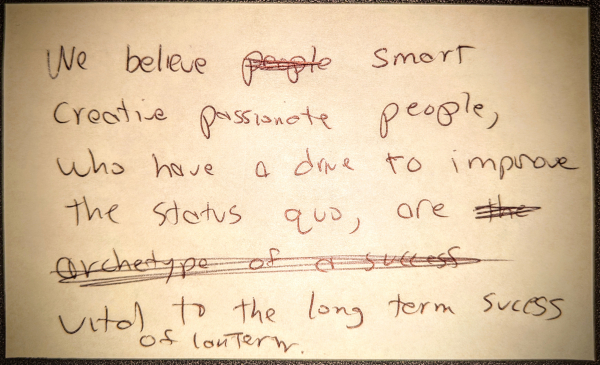Learnings
Personal experiences in leadership...
When Shapor and I sat down, and we started thinking about what would become Chronicle, I must admit that my mind was focused on potential products and technological problems that I wanted to solve. Now while it’s important to do that, I never really expected how impactful and vital non engineering skills would be on the journey to where we are today.
As I sit here 4 years later, I wish I could go back and give myself, a healthy smack on the side of the head. I’d read the classic books on management, leadership, and business. In fact, Andrew Grove’s book, High Output Management, is sitting on my desk right now. I read it many years ago, and the notes I took while reading it are still stuffed within its pages. But to be blunt, just as reading a book on C++ doesn’t make you a C++ engineer, neither does reading books on leadership make you a leader.
You see, I had given this advice to a hundred people, “go build real things, don’t just read books on how to do it.” But for some reason, I never took my own advice when it came to being a leader that people would want to work with. I’m a huge fan of Simon Sinek, and his work is magical and inspiring. In one of his books he describes the foxhole test. The description of which, I’ll share using Simon’s own words:
“Every single one of us should look at our managers or the leaders of the companies we work for and ask ourselves, ‘Would I want to be in a foxhole with you?”
After a lot of soul searching, I realized… I wasn’t. I wanted to be that person, but it wasn’t me at that moment in time. It was then that I made the conscious decision to do something about it.
I had a goal post, I knew where I wanted to be, I just didn’t know how to get there. I started studying leaders who inspired people. These are leaders who don’t just deliver results for their organizations, they are leaders who inspire individuals and teams to grow beyond their limits and preconceptions. They are leaders who help people realize their true and full potential. There is a strong dose of a servant mindset in these leaders, and it was a mindset I simply didn’t have.
Reading books didn’t put me on the right path. Job titles didn’t do that either. There is the old saying “Your title makes you a manager. Your people make you a leader.” What I needed was someone to help me start the journey on which I wanted to embark. Chronicle’s CEO, Stephen Gillett, suggested I work with a coach. It was at that moment, that everything started to change.
I met Marie-Jeanne in, for lack of a better term, a mutual interview. We clicked early on, and her time with me became a transformative moment in my professional career. In my first official coaching session with her, I had a list of things that I wanted. Now, there is little point to listing them here, but her feedback and ongoing advice made me realize: These aren’t things you demand, these are things you earn.
Slowly, over the next couple years, it started to click. The things I wanted, started to happen, but not because of position or title. They started to happen because I worked hard to let everyone know they could trust me and I’d be as honest with them as possible. Those aren’t empty words, they are immutable attributes that I cherish and value. I began to realize that leadership is being there when people need guidance or support, and being the person they seek out to get it. Being a good leader, is using that power to help drive them in the right direction. Now while I worked to build trust with everyone I could, I also tend to not sugar coat things. I have the nickname Chainsaw, and at times, I live up to it. I can be direct and a matter of fact, but after building that trust with everyone, our people know that it’s from a good place. I’m tirelessly trying to push us all harder, to do more, to be better.
As Chronicle started to grow beyond the first handful of employees… I started to write a personal culture document for the company, but I never shared it because I don’t think that my personal desires should be codified into words and then shared as if it was some insightful scripture. Instead, I wanted to personally deliver on those words through consistency and action. One part of that document that I will share, is this:
[Tech companies] fall in love with technology and forget the people behind it. They tend to think the idea, solution, or approach is the key asset, when I believe the key asset is the people who develop it and take it to market. We must always value people over process and never fall in love with pride in our successes, because our successes are the end result of our employees’ efforts.
I believe that then, I believe it now.
Eric Schmidt and Jonathan Rosenberg wrote a book about the legendary Silicon Valley coach Bill Campbell. The title is Trillion Dollar Coach, and if you haven’t read it, you probably should. Reading about Bill, I only wish I had the chance to meet with him before he passed away. I think his personality and mine would have clicked.
Everyday I learn more. I push myself to try to be better than I was yesterday. With the support and faith of the people who I’ve mentioned here, and all the employees at Chronicle, it’s a journey that I’ve been allowed to take, and for that, I’m humbled.
More to come.





